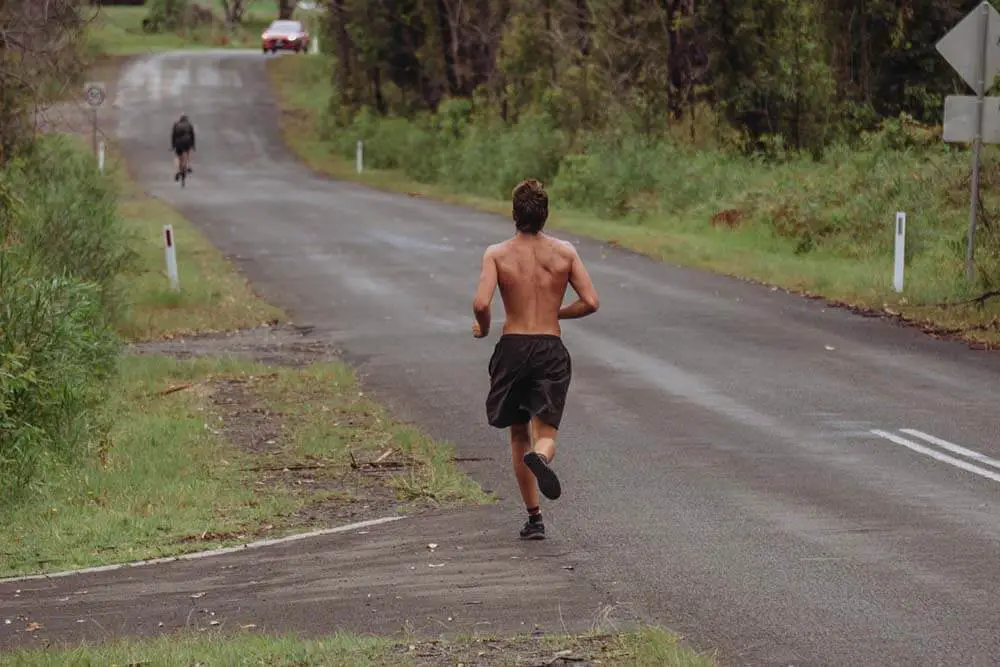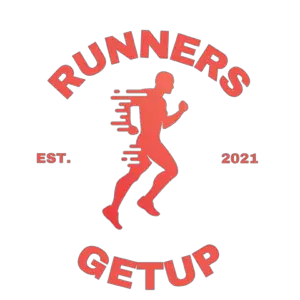This post contains affiliate links.
You decided to start running but every time you try you run out of breath so easily which gets you frustrated. Many beginners feel that way. When I first started out, I felt the same way too. But over time I learned how to run without running out of breath.
In order to run without running out of breath, you have to build your aerobic capacity by running slow while gradually increasing the duration of your runs as you progress. This will allow your body to adapt to the activity and build your overall endurance.
But that’s not all. Many factors contribute to why you run out of breath when running. Ahead, we will look at these factors as well as what you can do to fix them. We will also look at a tool we can use to determine the “right pace” so you won’t run out of breath easily. Lastly, at the end of this article, I will give you a free beginner’s program to build your endurance so you can start running without feeling breathless.

Why You Run Out Of Breath When Running
You may have seen a guy running around the park for hours without ever getting exhausted. And then there is you who feels breathless after running for just over a mile. Why do you run out of breath so quickly when running?
There are three common reasons as to why you easily run out of breath during a run:
- You have no endurance – the most obvious reason is that you just haven’t built endurance for this activity yet.
- You’re running too fast too soon – another common reason is going too fast too soon. This is the common reason why athletic people who aren’t exposed to running long distances run out of breath quickly.
- You’re too tense – Sometimes when you’re running you’re thinking of so many things instead of just running relaxed.
- You have poor posture – A slouched back and head facing down prevents your lungs to expand and take in air.
- You have poor nutrition – Carbohydrates are the ideal source of energy for running. If you cut back too much on carbs, your body may not be as efficient.
How To Run Without Running Out Of Breath
Start Slow
Often beginner runners tend to run fast when they’re feeling fresh. I get it. When I first started out, I was doing the same thing. It’s tempting to try to run like the pros. Especially if you’re already athletic to begin with.
However, this strategy usually backfires after a few minutes. You’ll start feeling exhausted and out of breath and it will feel like there’s no way you could get back to a decent pace.
A better strategy is to start slow. Start at RPE 5 and gradually increase to RPE 6-7 (more on this later) as you progress. This is better because it allows you to adjust your pace depending on how you feel about the later parts of your run.
Run At A Conversational Pace
Running at a conversational pace means running at a pace at which you are able to hold a conversation. This is a relatively slower pace than your usual run. You can think of it as a jog.
Related post: Running Vs Jogging: What’s The Difference? (Comparison Chart)
Although you will not stick to this pace forever, it is important that as a beginner you practice running at this pace to build your aerobic capacity.
This helps build your endurance so you can run longer without running out of breath.
Fix Your Posture
Your posture is very important for a better running experience. Although all runners run differently, there are some foundations of posture that runners have to adhere to.
Listed below are the proper running posture of your head all the way down to your ankle.
- Chest open
- Torso upright or slightly forward depending on where you’re comfortable. But never lean back or bend forward from your hips.
- Wrist and hands are relaxed but not floppy. Maintain a loose fist
- Your pelvis is like a full bucket. If it tilts forwards, backward, or sideways, you spill its contents. Maintain your pelvis in a neutral position. Difficulty in doing so indicates a musculoskeletal problem (e.g. muscle tightness and weakness).
- Knees are slightly bent to resist rotation and provide better shock absorption.
- Foot strike depends on your technique and anatomy. Contrary to common beliefs, there’s no “correct” part of the foot for landing. Therefore, you should land wherever is comfortable for you whether it’s with your heels, midfoot, or balls of the foot.
- Your head should be perfectly aligned with your entire body. Resist looking down on the ground. That is one of the very common mistakes beginner runners make when running. Look straight forward and keep your head in a neutral position.
- Let your shoulders hang loose but retract your shoulder blades backward to open up your chest and prevent a round back.
- Your arms should feel relaxed. You should let the movement flow instead of directing your arms to move a certain way.
- Your ankles should feel relaxed when your foot is in the air.
Relax
Being tense while running is a waste of energy. A common mistake of beginner runners is that they’re too tense trying to adhere to a certain form or trying to maintain a certain speed.
Instead, relax and let it all go. Don’t think about your pace, too much. Adhere to the basic running form listed above but let it flow naturally. Run the way that is most natural to you. Focus on the run and not on so many technicalities.
You’ll be surprised how much better you feel when you run relaxed.
Related post: 10 Useful Tips To Enjoy Running (And Never Get Bored)
Eat Carbs
We were conditioned to believe that carbs are bad for us. But if you want to perform better, you have to have the right fuel for your body. Carbs are the simplest, most readily available energy source for our body. It’s our body’s fuel of choice and we shouldn’t deprive ourselves of it.
However, don’t take this as an excuse to binge eat and consume loads of carbs from sweets or fast food chains. Instead, get your carbs from healthy sources such as fruits, vegetables, and whole grains.
Practice Your Breathing
The ideal breathing for any activity is diaphragmatic breathing—that is, breathing through your belly. It allows your lungs to expand more and get more oxygen.
You should also try to relax your breathing. Most beginners tend to breathe too fast when they’re running to compensate for their exhaustion. This results in an elevated heart rate which gets you out of breath quicker.
Instead, control your breathing. One way for me to make sure that I’m in control of my breathing is by using my stride as a breathing rhythm. I usually do two inhalations (one for every step) and then one big exhalation for two steps.
So I do inhale (one step), inhale (one step), and long exhale (for two steps).
How To Use Rate Of Perceived Exertion (RPE) To Avoid Running Out Of Breath
The Rate of Perceived Exertion (RPE) is a subjective scale that is used to rate your exertion or effort towards a given activity.
Here’s a table that represents the RPE scale and how each scale feels like.
| RPE | Translation | Feels Like… |
|---|---|---|
| 10 | Maximum Effort | Running for your life |
| 9 | Very Hard Intensity | 100m Sprint |
| 8 | Hard Intensity | This hurts |
| 7 | Hard Activity | Don’t want to talk |
| 6 | Hard Activity | Able to say short sentences |
| 5 | Challenging | Conversational pace. Able to gossip with friends |
| 4 | Comfortable | Recovery run |
| 3 | Easy | Shopping |
| 2 | Very Easy | Walking to the fridge |
| 1 | No Exertion | Doing nothing |
The ideal pace for running long distances is RPE 6-7. However, if you’re a beginner, running at this RPE may run you out of breath because you haven’t built the endurance yet.
The best way to build your endurance is by running at a conversational pace (RPE 5) and gradually increasing the duration of your run. Once you are able to maintain 30-45 mins of running at a slower pace, gradually increase the rate of perceived exertion to 6 or 7.
This will allow you to build your aerobic capacity which is the foundation of running.
Beginners Program To Improve Endurance
Here’s a sample program you can do to improve your endurance so you never run out of breath while running.
Note that everything is done at a conversational pace (RPE 5). The reason why I used “jog/walk” is to tell you that it’s okay if you have to walk when you’re starting to run out of breath.
Eventually, you will be able to jog the whole duration without running out of breath. But the only way to do that is by building your aerobic capacity by running slowly.
Week 1
- Monday: 15 mins jog/walk
- Tuesday: Rest
- Wednesday: 15 mins jog/walk
- Thursday: Rest
- Friday: 15 mins jog/walk
- Saturday-Sunday: Rest
Week 2
- Monday: 17 mins jog/walk
- Tuesday: Rest
- Wednesday: 17 mins jog/walk
- Thursday: Rest
- Friday: 17 mins jog/walk
- Saturday-Sunday: Rest
Week 3
- Monday: 19 mins jog/walk
- Tuesday: Rest
- Wednesday: 19 mins jog/walk
- Thursday: Rest
- Friday: 19 mins jog/walk
- Saturday-Sunday: Rest
Week 4
- Monday: 21 mins jog/walk
- Tuesday: Rest
- Wednesday: 21 mins jog/walk
- Thursday: Rest
- Friday: 21 mins jog/walk
- Saturday-Sunday: Rest
Week 5
- Monday: 23 mins jog/walk
- Tuesday: Rest
- Wednesday: 23 mins jog/walk
- Thursday: Rest
- Friday: 23 mins jog/walk
- Saturday-Sunday: Rest
Week 6
- Monday: 25 mins jog/walk
- Tuesday: Rest
- Wednesday: 25 mins jog/walk
- Thursday: Rest
- Friday: 25 mins jog/walk
- Saturday-Sunday: Rest
Week 7
- Monday: 27 mins jog/walk
- Tuesday: Rest
- Wednesday: 27 mins jog/walk
- Thursday: Rest
- Friday: 27 mins jog/walk
- Saturday-Sunday: Rest
Week 8
- Monday: 30 mins jog/walk
- Tuesday: Rest
- Wednesday: 30 mins jog/walk
- Thursday: Rest
- Friday: 30 mins jog/walk
- Saturday-Sunday: Rest

